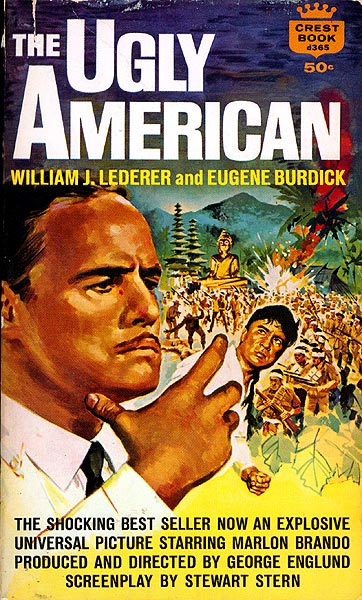
If it were not an injustice to their physical appearance, I would say the ePRT members here in Fallujah are ugly Americans incarnate. They come their mission with expertise from stateside: Scott Albert served as a city administrator in north Texas; Jurist Awal is an electricity expert; Eric Dolbeare knows everything about wheat; Hunter Keith is a Middle East historian and advises Iraqis on governance. (Keith is also a distant cousin of Ugly American co-author Eugene Burdick, and a friend of mine.) Still others are the best sort of diplomats, unassuming in demeanor and insistent on doing their work among Fallujans, rather than from the relative safety of a base, though they do live on one.
Graeme Wood writes: Every Marine officer in Iraq who sees me reading The Ugly American nods in recognition and asks me what I think of it
The Presentable Americans
FALLUJAH -- Every Marine officer who sees me reading The Ugly American (another MWR library treasure) nods in recognition and asks me what I think of it. At first I thought the Marine Corps had recruited an unusually bookwormish class of junior officers. Later, a lieutenant told me it was on the Marines' required reading list. I can think of few better texts for their curriculum.
The Ugly American (written by Eugene Burdick and William Lederer in 1958) relates a series of episodes in US efforts to reach out to Sarkhan, a fictional Southeast Asian country. The novel's title has come to mean an American style of boorishness, with English spoken in loud voices and an inability to understand foreign currency. (I think of the Simpsons episode in which Homer goes to Brazil and walks around with a t-shirt depicting Uncle Sam taking a bite of a globe, with big letters underneath, "TRY AND STOP US.") The characters in the actual Ugly American are, by and large, exactly the opposite of this stereotype. They speak Sarkhanese. They live among Sarkhanese, and they come up with ideas and schemes sensitive to Sarkhanese culture. The ugly American himself, Homer Atkins, is not a lout and boor, just a physically hideous man.
The book's relevance to the Marine mission turns out to be substantial, and growing. The Marines here are done shooting people, mostly. Instead, they have prioritized protecting small groups of US government employees -- embedded Provincial Reconstruction Teams, or ePRTs -- who undertake quixotic projects aimed at fixing Iraq's infrastructure. If it were not an injustice to their physical appearance, I would say the ePRT members here in Fallujah are ugly Americans incarnate. They come their mission with expertise from stateside: Scott Albert served as a city administrator in north Texas; Jurist Awal is an electricity expert; Eric Dolbeare knows everything about wheat; Hunter Keith is a Middle East historian and advises Iraqis on governance. (Keith is also a distant cousin of Ugly American co-author Eugene Burdick, and a friend of mine.) Still others are the best sort of diplomats, unassuming in demeanor and insistent on doing their work among Fallujans, rather than from the relative safety of a base, though they do live on one.
The ePRTs deployed to Iraq in 2005, and their work is still novel enough to be of uncertain value. On one hand, they do unambiguous good: they build schools and hospitals, they fix water treatment plants, they suggest improvements to Iraqis about how they can grow more crops with less effort. Most of all, they put a non-military face on the American mission. To go anywhere, they need a massive, noisy escort of Marines in mine-resistant vehicles and full body armor. But when the ePRT members dismount their steel steeds and walk into a city council meeting, they leave body armor behind and work as closely with Iraqi civilians as anyone else in the country.
On the other hand, their efforts present the same quandaries as all aid. Showering cash on Iraqis encourages malaise. And having this shadow reconstruction agency, working parallel to (and barely uncoordinated with) the government in Baghdad, pisses off the Iraqi government something fierce. Nouri al-Maliki received a briefing on the ePRTs' work and quite understandably huffed about being undermined by the very US government was trying to prop him up. If money is to shower down on Fallujah, let it be from a single spout.












